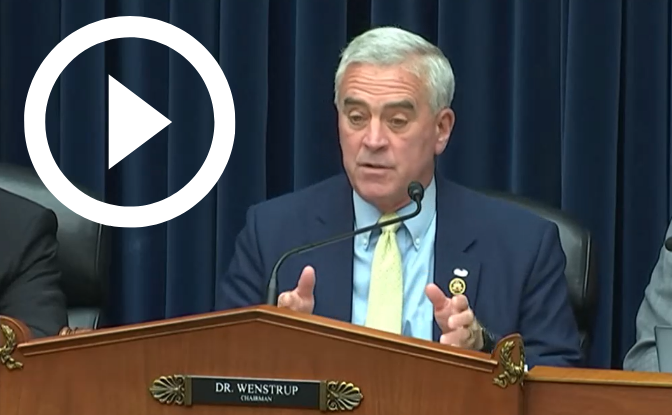Wenstrup Opens Hearing on White House’s Role in Pandemic Preparedness and Response
WASHINGTON — Select Subcommittee on the Coronavirus Pandemic Chairman Brad Wenstrup (R-Ohio) opened today’s hearing titled “Examining the White House’s Role in Pandemic Preparedness and Response” by explaining that after the COVID-19 pandemic, Congress passed the Prepare for and Respond to Existing Viruses, Emerging New Threats Pandemic Act — more commonly referred to as the PREVENT Pandemics Act. This legislation required the White House to establish a permanent Office of Pandemic Preparedness and Response Policy (OPPR). OPPR is charged with leading, coordinating, and implementing actions related to potential biological threats and possible significant public health-related disruptions in the United States. Chairman Wenstrup clarified that the purpose of today’s hearing is to ensure this new office aids preparation for a future public health crisis and does not add another layer of unnecessary bureaucracy. The recently appointed Director of OPPR, Major General Paul Friedrichs, will provide insight about the authority and purpose of OPPR in America’s existing biodefense safety system as well as speak to the White House’s role in pandemic preparedness and response.
Below are Select Subcommittee Chairman Wenstrup’s remarks as prepared for delivery:
The COVID-19 pandemic lasted over 1,000 days, took millions of lives, and extracted a crushing physical, emotional, social, and economic toll.
There will be other pandemics or significant public health emergencies that test our nation’s preparedness and resiliency in the future.
We cannot turn a blind eye to this fact; we cannot pretend this is a one-off or even a once-in-a-century catastrophic event.
Americans rightfully demand that their government ‘does better’ to prepare for the next pandemic.
‘Doing better’ requires whole-of-government effort.
Executive departments and agencies should be well on their way to collecting and analyzing lessons learned and implementing corresponding changes to their plans and priorities.
Based on lessons learned – including recommendations that this Select Subcommittee will make later this year – Congress must ensure that departments and agencies have the necessary authorities and resources to prepare for and respond to the next pandemic.
In an effort to ‘do better’, Congress passed the Prepare for and Respond to Existing Viruses, Emerging New Threats Pandemic Act, more commonly referred to as the PREVENT Pandemics Act.
Included in the PRVENT Act was the requirement for the White House to establish the Office of Pandemic Preparedness and Response Policy as permanent component of the Executive Office of the President.
With the creation of this office, the White House now has a permanent element dedicated to pandemic preparedness and response – fully focused on ‘doing better’.
And we are here to ensure that this new office helps us achieve that. Not adds another layer of bureaucracy.
OPPR is charged leading, coordinating, and implementing actions related to preparedness for, and response to, known and unknown biological threats or pathogens that could lead to a pandemic or to significant public health-related disruptions in the United States.
Appearing before us today is Major General (retired) Paul Friedrichs.
General Friedrichs is the inaugural Director of the White Office of Pandemic Preparedness and Response Policy, which was officially stood up in August 2023.
Today, I hope we can have serious and productive conversation about how the whole of government can ‘do better’.
About how we can ‘do better’ next time.
And while ‘doing better’ must involve plans to prevent or mitigate the loss of life and devastating emotional, social, and economic consequences, we also need to address another casualty of the pandemic.
That casualty is Americans’ trust in public health and their government’s ability to respond to a crisis of this magnitude.
‘Doing better’ must involve restoring public trust.
Integrity. Experience. Credibility. These are the attributes that Americans must see in public health institutions and officials.
If we cannot restore that public trust, the most comprehensive, sound preparedness and response plan will be in vain.
I hope this hearing will provide us with an opportunity to discuss what lessons were learned during the pandemic and how we can ‘do better’.
These lessons are critical in preparing for future pandemics.
We need to plan and prepare for potential pandemic pathogens and emerging biological threats with the same level of urgency and effort that we plan and prepare for the actions of potential adversaries.
Americans are counting on us to do so.
I look forward to a robust and on-topic discussion.
###
